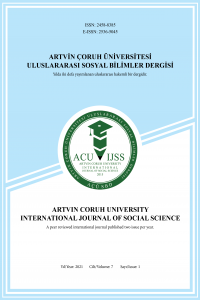Sosyal Hizmet Bölümü Öğrencilerinin Geleceğe Yönelik Mesleki ve Akademik Beklentileri
Sosyal Hizmet bölümü Türkiye’de son 5 yıl içerisinde hem devlet üniversitelerinde hem de vakıf üniversitelerinde hızlı bir artış göstermiştir. Bu hızlı artışın getirmiş olduğu problemlerin öğrenciler üzerinde nasıl bir etki yarattığı ve kendilerini gelecek beklentileri üzerinden akademik ve mesleki bağlamda nasıl yorumladıkları önemli bir konu haline gelmektedir. Artan niceliğin öğrenci odağında nasıl tepki gördüğü ve nitelik bakımından nasıl algılandığı soruları da ayrıca bu çalışmanın üzerinde durmak istediği noktalar olmuştur. Aynı zamanda bu çalışmada Sosyal Hizmet bölümü öğrencilerinin akademik ve mesleki beklentilerinin betimlemeye çalışarak hızla artan bölüm sayısının, öğrenci merkezli bir yaklaşımla, nasıl karşılık bulduğu araştırılmaya çalışılacaktır.
Anahtar Kelimeler:
Akademik Beklenti, Mesleki Beklenti, Sosyal Hizmet
Professional and Academic Expectation for the Future of Social Work Students
The Social Work Major has shown a rapid increase in Turkey over the past 5 years in both public and private universities. It is becoming an important issue how the problems brought about by this rapid increase have had an impact on students and how they have interpreted by students in the academic and professional context through their expectation for the future. Increasing the number of Social Work Major in universities how students react and how it is perceived in terms of quality has been a point that this study would like to emphasize. At the same time, in this study, it will be tried to investigate both how the rapidly increasing number of SW Majors are perceived by students and tried to describe the academic and professional expectations of the students especially with a student-centered approach.
Keywords:
Academic Expectancy, Professional Expectacancy, Social Work,
___
- Acar, H. ve Çamur Duyan, G. (2003). Dün¬yada sosyal hizmet mesleğinin ortaya çı¬kışı ve gelişimi. Toplum ve Sosyal Hizmet, 14(1), 1-19.
- Alptekin, K., Topuz, S., ve Zengin, O. (2014). Türkiye'de çocuğun refahı ve korunması: kapsayıcı bir yaklaşım arayışı. Türkiye’de sosyal hizmet eğitiminde mevcut durum: tespitler, analizler ve öneriler. Sosyal Hizmet Sempozyumu. 353-366. Kocaeli: Kocali Üniversitesi.
- Danış, M. Z. (2007). Sosyal Hizmet Mesleği ve Disiplininde Sosyal Politikanın Yeri ve Önemi. Toplum ve Sosyal Hizmet, 18(2), 51-64.
- Dixon, J. (2005). Foster carers: why they stay and why they leave (Book Reviews). Child and Family Social Work, 10, 249-254.
- Freund, A. (2006). Work and work attitudes on social workers: do they predict organizational reputation? Business and Society Review, 111(1), 67-87.
- Gökçearslan Çifci, E. ve Gönen, E. (2011). Sosyal hizmet uygulamalarında etik karar verme süreci. Toplum ve Sosyal Hizmet Dergisi, 22(2), 149-160.
- Hovardaoğlu, S. (2000). Davranış bilimleri için araştırma teknikleri. Ankara: VE-GA Yayınları.
- Işıkhan, V., Erbay, E., Akçay, S., ve Ege, A. (2016). Sosyal hizmet bölümü öğrencilerinin mezuniyet sonrası gelecek planları: Ankara, Başkent ve Hacettepe üniversitesi örneği. Toplum ve Sosyal Hizmet, 27(1), 7-24.
- Karasar, N. (1999). Bilimsel araştırma yöntemi. Ankara: Nobel Yayın Dağıtım.
- Olin, J. (2013). The public and the profession’s perception of social work. Columbia Social Work Review, 4, 92-102.
- Öztürk, A. B. (2009). Sosyal hizmet etiğinde farklı yaklaşımlar. Toplum ve Sosyal Hizmet, 20(1), 105-116.
- Pierson, J. (2012). Understanding Social Work: History and Contex. New York: Mc Graw Hill Open University Press.
- Pincus, A., ve Minahan, A. (1973). Social Work Practice: Model and Method. Itasca, IL: F.E. Peacock.
- Sheafor, B. W. ve Horejsi, C. R. (2002). Techniques and guidelines for social work practice, 6. Baskı, AB Publication: Boston.
- Whitaker, T. (2008). Who wants to be a social worker? Career influences and timing. NASW Membership Workforce Study. Washington, DC: NASW.
- Wilson, G. Ve McCrystal, P. (2007). Motivations and career aspirations of msw student in Nothern Ireland. Social Work Education, 26(1), 35-52.
- Yiğit, T. (2017). Türkiye'de Sosyal Hizmet Eğitim/Öğretiminde. Kalite Güvence Sistemi ve Akreditasyon. Standartlarına İlişkin Bir Model Çerçeve Önerisi. Toplum ve Sosyal Hizmet, 28(1), 151-168.
- ISSN: 2458-8385
- Yayın Aralığı: Yılda 2 Sayı
- Başlangıç: 2015
- Yayıncı: Artvin Çoruh Üniversitesi
Sayıdaki Diğer Makaleler
İç Tehditler ve Dış Politika: Gürcistan Dış Politikası Örneği (1991-2003)
Sağlık Yöneticilerinin Paternalist Liderlik Davranışlarının Çalışanların İş Doyumu Üzerine Etkisi
Sosyal Hizmet Bölümü Öğrencilerinin Geleceğe Yönelik Mesleki ve Akademik Beklentileri
Avrupa Birliği Bölgesel Politikası ve Türkiye: Kalkınma Ajansları Bağlamında Bir Analiz
